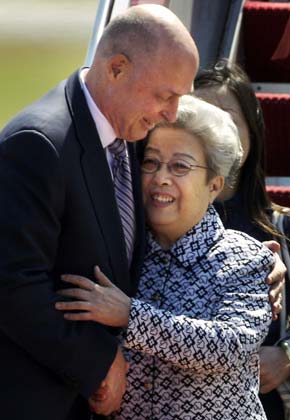Optimism high at second trade talks
By Jiang Wei (China Daily)Updated: 2007-05-22 06:43
|
|
China and the United States are expected to make tangible progress on trade and services in the second round of the strategic economic dialogue.
Vice-Premier Wu Yi, who leads the Chinese delegation to Washington, wrote an opinion piece in the Wall Street Journal on the eve of the talks. She said the United States should lift its restrictions on hi-tech exports to China, a topic likely to be high on the Chinese delegation's agenda.
Wu said the move will help to address the trade imbalance between the two countries, which the US is concerned about.
The two-day dialogue, which opens today, is also expected to prevent the US from taking action to force revaluation of the renminbi.
| |||
Unnamed sources were quoted by the Financial Times as saying staff-level negotiators have agreed that foreigners should be allowed to buy a 49-percent stake in all but the biggest five Chinese banks, up from the current maximum of 25 percent. But top Chinese officials apparently have not signed any agreement on this.
US officials also expect Beijing to relax limits on foreign ownership of at least some securities firms and they want a higher quota for foreign investment in the stock market.
US Treasury Secretary Henry Paulson said the two sides had reached consensus in principle on a number of issues and what they were now discussing were "the signposts and tangible specific steps to be taken to show progress".
The two countries are also scheduled to discuss a wide range of issues, such as opening more commercial air routes between the two, increasing domestic demand in China for clean coal energy, and facilitating tourism.
Meanwhile, senior officials from both sides said it was more important to stick with a long-term approach to resolving bilateral trade disputes, rather than concentrating on specific issues.
The strategic economic dialogue serves as a long-term and far-reaching platform between the two sides, said Wang Xinpei, spokesman with the Ministry of Commerce. He said the second round of the meeting should yield positive progress as the presidents of both countries, who initiated the talks, expect.
| Comments:Seek win-win
solutions As two major growth engines in the world economy, China and the United States have born the brunt of the increasing trade imbalance in their own ways. China-US economic dialogue must seek consensus The Sino-American Strategic Economic Dialogue ought to settle three major questions or at least reach some consensus. |
"As the largest developing country and the largest developed country in the world China and the United States still largely complement each other economically," Wang said.
The dialogue comes at a time when the two countries are facing increasing trade disputes, and rising trade protectionism in the United States.
The Chinese central bank announced late last week that the band in which the yuan will be allowed to fluctuate against the dollar each day will be widened from 0.3 percent to 0.5 percent above or below the previous day's closing value.
(China Daily 05/22/2007 page5)
|
||
|
||
|
|

